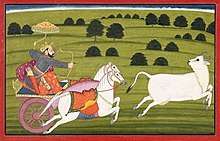Prithvi
Prithvi or Prithvi Mata (Sanskrit: पृथ्वी, pṛthvī, also पृथिवी, pṛthivī) "the Vast One" is the Sanskrit name for the earth as well as the name of a devi (goddess) in Hinduism and some branches of Buddhism. She is also known as Bhūmi in later texts like Puranas. In the Rigveda, she is the consort of Dyaus Pita. But later in Puranas, she was renamed as Bhūmi and identified as lord Vishnu's wife. She is considered to be an avatar of goddess Lakshmi in the Puranas.
| Prithvi | |
|---|---|
Goddess of the Land The Mother Earth | |
 | |
| Other names | Bhudevi |
| Devanagari | पृथ्वी |
| Sanskrit transliteration | Prithvi gowda |
| Affiliation | Devi, Bhudevi, Pancha Bhoota |
| Abode | Vaikuntha, Dyuloka |
| Planet | Earth |
| Mantra | Om Bhumhaya Namah |
| Mount | Cow, Elephant |
| Personal information | |
| Consort | Dyaus Pita (According to the vedas) Varaha(According to Puranas) |
| Children | Mangala and Narakasura |
| Classical elements |
|---|
|
Stoicheion (στοιχεῖον) |
|
Wuxing (五行) |
|
Godai (五大) |
|
Bön |
|
Alchemy |
As Pṛthvī Mātā ("Mother Earth") she is complementary to Dyaus Pita ("Father Sky").[1] In the Rigveda, Earth and Sky are primarily addressed in the dual as Dyavapṛthivi.[2] She is associated with the cow. Prithu, an incarnation of Viṣṇu, milked her in cow's form.
Despite strong historical Hindu influence, the name is also used for national personification of Indonesia and Malaysia, where the country is internally referred as "Ibu Pertiwi" (in Indonesian or Malay language).
In Buddhism
In Buddhist texts and visual representations, Pṛthvī is described as both protecting Gautama Buddha and as being his witness for his enlightenment. Prithvi appears in Early Buddhism in the Pāli Canon, dispelling the temptation figure Mara by attesting to Gautama Buddha's worthiness to attain enlightenment.[3] The Buddha is frequently depicted performing the bhūmisparśa or "earth-touching" mudrā as a symbolic invocation of the goddess. [4]
Pṛthvī Sūkta
The Pṛthvī Sūkta (or Bhūmī Sūkta) is a hymn of the Atharvaveda (12.1).
Epithets
| Category | Transliteration | Gloss |
|---|---|---|
| Provider | Bhūmi | Soil |
| Dhatri | Nursing Mother | |
| Dharitri | Nurturer | |
| Janitra | Birthplace | |
| Medini | Nurturer | |
| Prshni | Mother of Plants | |
| Vanaspatinam Grbhir Osadhinam | Womb of Forest Trees and Herbs | |
| Vishvadhaya | All-Nourishing | |
| Vishvagarbha | World's Womb | |
| Vishvamshu | Producer of Everything | |
| Vishvasvam | Source of Everything | |
| Sustainer | Dhar | Upholder |
| Drdha | Steady One | |
| Ksama | Patient One | |
| Sthavara | Stable One | |
| Vishdava | All-Preserving | |
| Vishvadharini | All-Supporting | |
| Vishvamhara | All-Bearing | |
| Enricher | Ratnagarbha | Repository of Gems |
| Ratnavati | Abounding in Jewels | |
| Vasundhara | Bearer of Treasure |
See also
References
- Leeming, David; Fee, Christopher (2016). The Goddess: Myths of the Great Mother. Reaktion Books. ISBN 978-1-78023-538-7.
- Doniger O'Flaherty 2007, p. 201, 330.
- Shaw 2006, p. 27.
- Shaw 2007, p. 17.
- Doniger O'Flaherty, Wendy, ed. (2007). The Rig Veda: An Anthology: One Hundred and Eight Hymns. Harmondsworth: Penguin Books. ISBN 9780140449891.CS1 maint: ref=harv (link)
- Shaw, Miranda Eberle (2006). Buddhist Goddesses of India. Princeton University Press. pp. 27. ISBN 978-0-691-12758-3.CS1 maint: ref=harv (link)
Further reading
- Dictionary of Hindu Lore and Legend (ISBN 0-500-51088-1) by Anna Dallapiccola
- Hindu Goddesses: Vision of the Divine Feminine in the Hindu Religious Traditions (ISBN 81-208-0379-5) by David Kinsley
